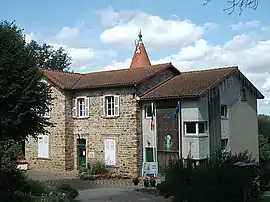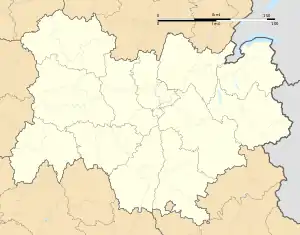Crevant-Laveine | |
|---|---|
 The town hall in Crevant-Laveine | |
Location of Crevant-Laveine | |
 Crevant-Laveine  Crevant-Laveine | |
| Coordinates: 45°54′56″N 3°22′34″E / 45.9156°N 3.3761°E | |
| Country | France |
| Region | Auvergne-Rhône-Alpes |
| Department | Puy-de-Dôme |
| Arrondissement | Thiers |
| Canton | Lezoux |
| Intercommunality | Entre Dore et Allier |
| Government | |
| • Mayor (2020–2026) | Agnès Tartry-Lavest[1] |
| Area 1 | 19.76 km2 (7.63 sq mi) |
| Population | 960 |
| • Density | 49/km2 (130/sq mi) |
| Time zone | UTC+01:00 (CET) |
| • Summer (DST) | UTC+02:00 (CEST) |
| INSEE/Postal code | 63128 /63350 |
| Elevation | 276–364 m (906–1,194 ft) (avg. 301 m or 988 ft) |
| 1 French Land Register data, which excludes lakes, ponds, glaciers > 1 km2 (0.386 sq mi or 247 acres) and river estuaries. | |
Crevant-Laveine (French pronunciation: [kʁəvɑ̃ lavɛn]) is a commune in the Puy-de-Dôme department in Auvergne-Rhône-Alpes in central France.
Places and monuments
Mountain castle, park by landscape architects, François-Marie Treyve and Joseph Marie. Château de la Terrasse, built from 1787 to 1790, by the architect Claude-François-Marie Attiret for Antoine Sablon du Corail (1762-1793) a close friend of the Count of Artois, who was inspired by Bagatelle to erect this castle. It is presented on a plan massed with two floors on basement, covered with a flat roof. The elements planned to crown the walls (balustrades, sculptures) were not carried out, as construction was halted due to the French Revolution. A dome was added in the 19th century.[3]
Notable residents
Patrick Depailler: Formula 1 driver (° Clermont-Ferrand August 9, 1944, † Hockenheim (Germany) August 1, 1980) is buried in the town cemetery.
See also
References
- ↑ "Répertoire national des élus: les maires" (in French). data.gouv.fr, Plateforme ouverte des données publiques françaises. 13 September 2022.
- ↑ "Populations légales 2021". The National Institute of Statistics and Economic Studies. 28 December 2023.
- ↑ "Congrès archéologique de France : Séances générales tenues ... Par la Société française pour la conservation des monuments historiques". 2000.